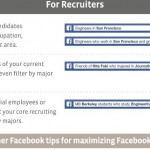 Puzzled about how to use Facebook to proactively find candidates? The social networking site — the world’s largest — has thoughtfully issued a quickie how-to guide for both job seekers and recruiters.
Puzzled about how to use Facebook to proactively find candidates? The social networking site — the world’s largest — has thoughtfully issued a quickie how-to guide for both job seekers and recruiters.
Oout last week, Graph Search for Job Search final offers no secret insights. Any recruiter who’s tried even a casual search won’t learn much. But if you’ve not given Facebook a try before, this one-page guide will help you get started, and may even surprise you.
One surprise is how simple Facebook’s search is to use. The example from the company uses “Engineers in San Francisco,” which yields a list of “More than 100 people” and includes anyone with “engineer” in their personal profile. The more specific you are, the better the results. If the results are still too broad, Facebook conveniently provides you a series of filters on the results page to help you narrow things down.
Think of Facebook’s Graph Search as a supplement, rather than a primary sourcing tool. Unlike LinkedIn Recruiter, which gives a way to contact prospects directly, on Facebook, you still need to have them confirm you as a friend. That’s another good reason why you and your search firm need a Facebook presence. When that prospect gets your friend request and decides to find out who you are before accepting, your FB page explains it all.
What makes this innocuous little guide more than a sourcing footnote is that it encourages using the social site for recruiting. Not only does it promote searching by recruiters, it also encourages job seekers to update their profiles with education and job histories, an area users have typically neglected to complete.
Facebook CEO Mark Zuckerberg has long had his sights set on recruiting, though job ads are the the only employment moneymaker.
The Graph Search for Job Search guide was compiled for the Facebook Social Jobs Partnership, a collaboration with the U.S. Department of Labor, the National Association of Colleges and Employers (NACE), DirectEmployers Association, and the National Association of State Workforce Agencies (NASWA).